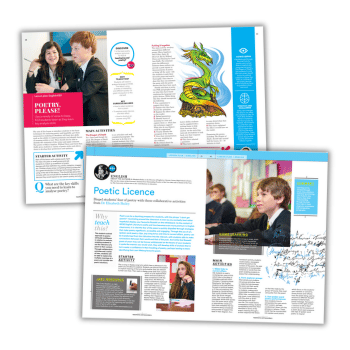KS3 poetry analysis lesson plan
Use a variety of verse to keep KS3 students keen as they learn key poetry analysis skills...
The aim of this lesson is to introduce students to the basic techniques for analysing poetry and hopefully, get them interested in studying it.
Students will learn key skills such as the ability to embed quotations and identify layers of meaning within a text. They should also be able to identify the viewpoint of the writer and apply criticism.
The poetry of Maya Angelou, Wilfred Owen and Carol Ann Duffy gives students a variety of poetic styles and allows them to develop their preferences and opinions.
Why teach this poetry analysis lesson?
Students will need to analyse language at GCSE. This lesson, using a variety of interesting and different poetry, is a great introduction to this vital skill.
Key curriculum links
- Select evidence from a poem
- Explore poetic devices and their effect
- Structure an answer using PEE
Claire Elliott is an English teacher at Colchester Academy, a Bright Tribe Trust school in Essex. She has 17 years of experience teaching KS3 and 4 students.
KS4 poetry analysis lesson plan
Dispel students’ fear of poetry with these collaborative activities from Dr Elizabeth Bailey…
Poetry can be a daunting prospect for students. The phrase “I don’t get poems!” may ricochet around the classroom as soon as you excitedly (and rather hopefully) display your favourite Rossetti on the whiteboard.
As the content of GCSE English Literature swells and time becomes even more premium in English classrooms, it is vital we quickly dispel the fear of the poem. You can do this via strategies that make poetry significant, accessible and engaging.
Through the use of art, spoken word poetry clips, pop song lyrics and links to current affairs, you can transform poetry from the ridiculous into the relevant. Students will be able to make connections between their world and that of the poet.
And while that Rossetti poem of yours may not be forever emblazoned on the hearts of your students in quite the manner you would wish, they will develop skills of analysis that in turn create a confidence in their handling of poetry. This will perhaps lead to them identifying their own lifelong favourite poem.
Why teach this poetry analysis lesson?
This student-centred approach to poetry will build confidence in relation to analysis. It will also enable students to see the relevance of a poem to their context.
Through collaborative activities and a series of links, students will be able to explore the multiple meanings of a poem and consider the poet’s intentions.
Dr Elizabeth Bailey is the Director of English at Clacton County High School in Essex. She was the winner of the Pearson’s National New Outstanding Teacher of the Year 2012 and was awarded Alumni of the Year from the University of Essex due to her contributions to education.











